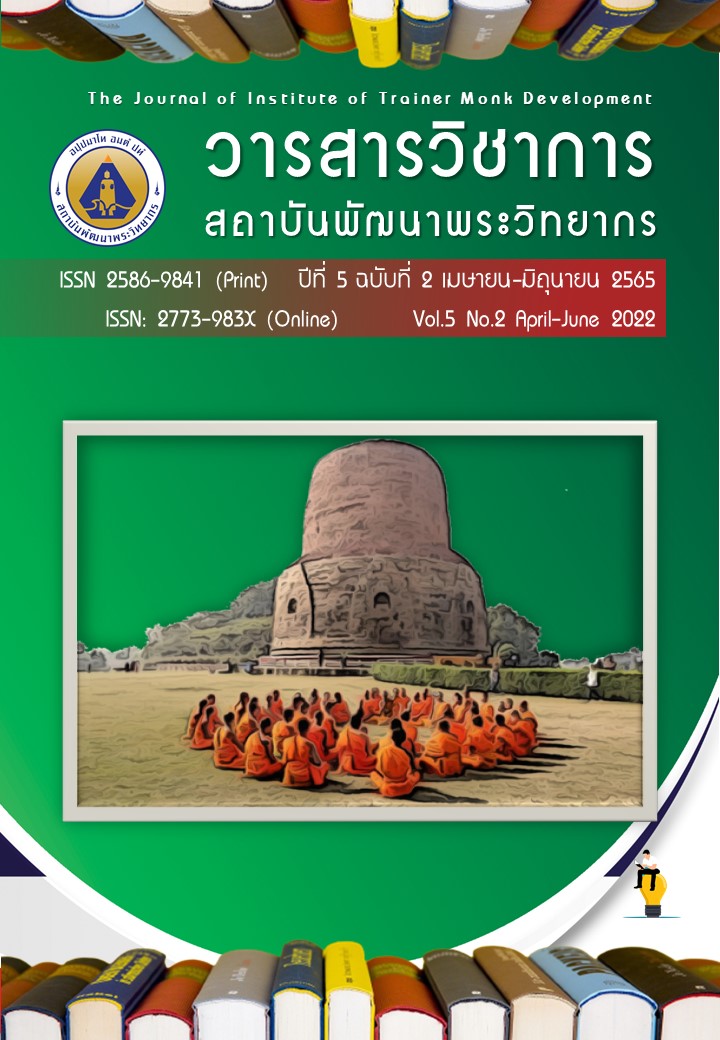An Analysis of Community Leadership According to the Principles of the Five Precepts and the Five Ennobling Virtues
Main Article Content
Abstract
This article aimed to analyze community leadership according to the principles of the Five Precepts and the Five Ennobling Virtues. This qualitative research by researching documents and in-depth interviews with key informants including 15 experts, village scholars and community representatives. The research tool was an interview form, analyzing the data by summarizing the data in a descriptive manner. The results showed that the concepts and theories of leadership based on Buddhism and modern science Most concepts are related to groups and members of the group are in constant relationship with each other in which one or more members are chosen or accepted as leaders due to differences in various aspects from other people within the group who are considered as followers or subordinates or subordinates Almost all definitions of leadership are related to the use of influence. Most of which will be leaders. The results of the analysis of community leadership according to the principles of the Five Precepts and the Five Ennobling Virtues revealed that the community leaders showed behaviors according to the principles of the Five Precepts, which corresponded with the community leadership as follows: 1) not encroaching on the lives of others 2) respecting the property rights of others 3) Not harassing another's husband or wife, 4) communicating without causing conflict, and 5) refraining from alcoholic beverages or any other vices. This is a proper practice of being a good leader can build confidence in building a peaceful community in the future.
Article Details

This work is licensed under a Creative Commons Attribution-NonCommercial-NoDerivatives 4.0 International License.
บทความที่ได้รับการตีพิมพ์เป็นลิขสิทธิ์ของวารสารวิชาการสถาบันพัฒนาพระวิทยากร
ข้อความที่ปรากฎอยู่ในบทความที่ได้รับการตีพิมพ์ในวารสาร ถือเป็นความรับผิดชอบของผู้เขียนบทความ และข้อคิดเห็นนั้นไม่ถือว่าเป็นทัศนะและความรับผิดชอบของกองบรรณาธิการวารสารวิชาการสถาบันพัฒนาพระวิทยากร
References
จิดาภา เร่งมีศรีสุข และ นภัทร์ แก้วนาค. (2564). การมีส่วนร่วมของประชาชนเพื่อการส่งเสริมความโปร่งใสขององค์ปกครองส่วนท้องถิ่นไทยในประชาคมอาเซียน. วารสารนวัตกรรมการจัดการศึกษาและการวิจัย, 3(2), 105-114.
ไชยะ เทพา. (2564). ภาวะผู้นำทางการเมืองในยุคโควิด-19. วารสารสหวิทยาการมนุษยศาสตร์และสังคมศาสตร์, 4(3), 1027-1044.
พระธรรมปิฎก. (ป.อ. ปยุตโต). (2546). ภาวะผู้นำ : ความสำคัญต่อการพัฒนาคน พัฒนาประเทศ.กรุงเทพฯ: ธรรมสภา.
พระพรหมคุณาภรณ์ (ป.อ. ปยุตฺโต). (2552). พุทธธรรม ฉบับปรับปรุงและขยายความ. (พิมพ์ครั้งที่ 11). กรุงเทพฯ: โรงพิมพ์มหาจุฬาลงกรณราชวิทยาลัย.
พระพรหมคุณาภรณ์ (ป.อ. ปยุตฺโต). (2557). พจนานุกรมพุทธศาสตร์ ฉบับประมวลธรรม. (พิมพ์ครั้งที่ 27). กรุงเทพฯ: โรงพิมพ์มหาจุฬาลงกรณราชวิทยาลัย.
มหาจุฬาลงกรณราชวิทยาลัย. (2539). พระไตรปิฎกภาษาไทย ฉบับมหาจุฬาลงกรณราชวิทยาลัย. กรุงเทพฯ: โรงพิมพ์มหาจุฬาลงกรณราชวิทยาลัย.
มหาจุฬาลงกรณราชวิทยาลัย. (2552). อรรถกถาภาษาไทย ฉบับมหาจุฬาลงกรณราชวิทยาลัย. กรุงเทพฯ: โรงพิมพ์มหาจุฬาลงกรณราชวิทยาลัย.
สำนักงานคณะกรรมการพัฒนาการเศรษฐกิจและสังคมแห่งชาติ. (2559). แผนพัฒนาเศรษฐกิจและสังคมแห่งชาติ ฉบับที่ 12. กรุงเทพฯ: สำนักงานคณะกรรมการพัฒนาการเศรษฐกิจและสังคมแห่งชาติ.
สิริพร มูลเมือง. (2564). คุณภาพชีวิตในการทำงานกับความผูกพันต่อองค์การของบุคลากร สำนักงานเขตสายไหม กรุงเทพมหานคร. วารสารนวัตกรรมการจัดการศึกษาและการวิจัย, 3(1), 29-40.
อรปภัตร จันทรสาขา. (2564). พฤติกรรมผู้นำที่ส่งผลต่อการพัฒนาองค์การบริหารส่วนตำบลในจังหวัดสิงห์บุรี. วารสารศิลปการจัดการ, 5(1), 259-271.
Covey, S. R. (1889). The 7 Habits of Highly Effective People. New York: Simon & Schuster.
Damnoen, P. S., Siri, P., Supattho, P. S., & Kaewwilai, K. (2021). The Development of Student Characteristics in According to the Nawaluk Framework of the Buddhist integration of Buddhapanya Sri Thawarawadee Buddhist College. Asia Pacific Journal of Religions and Cultures, 5(2), 126-135.
Lewis, P. V. (1980). Organizational Communication: The Essence of Effective Management. (3rd ed.). New York: John Wiley & Sons.
Tan, C. C., & Damnoen, P. S. (2020). Buddhist Noble Eightfold Path Approach in the Study of Consumer and Organizational Behaviors. Journal of MCU Peace Studies, 8(1), 1-20
Yusamran, P. P., Thitipasitthikorn, P. P., Damnoen, P. S., Thienthong, P. B., Rattana-ngam, S, & Homchan, P. (2021). Conservative And Inheritance of Atthami Bucha Day for Sustainable Promotion Tourism. Journal of Positive Psychology and Wellbeing, 5(3), 1400–1410.


